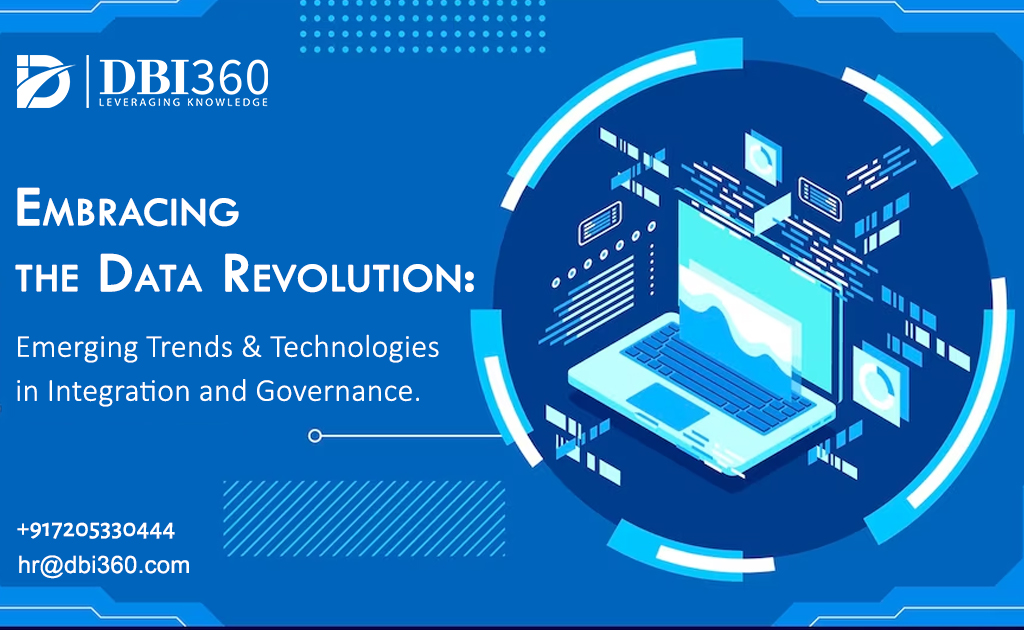In today’s data-driven landscape, businesses face increasing volumes and complexities of data. To stay ahead, organizations must integrate and govern their data assets. The future of data integration and governance holds immense potential for optimizing data management, enhancing security, and driving actionable insights.
This blog explores the latest trends shaping the future of data integration and governance, equipping businesses with the knowledge to navigate this evolving landscape.
Let’s delve into the exciting realm of emerging innovations and discover how they can revolutionize data management.
Trends in Data Integration:
-
Cloud-Based Integration: The shift to cloud computing has transformed data integration. Cloud-based solutions offer scalability, flexibility, and cost-efficiency, enabling organizations to integrate data from various sources.
-
Hybrid Integration: As businesses adopt a mix of cloud and on-premises systems, hybrid integration has emerged as a key trend. It allows data to flow between cloud and on-premises environments, ensuring connectivity and accessibility across the enterprise.
-
Self-Service Integration: Empowering non-technical users to perform data integration tasks is gaining traction. Self-service tools enable business users to integrate data without extensive IT support, reducing reliance on specialized skills and expediting decision-making processes.
-
Real-Time Integration: Real-time integration has become crucial with the increasing need for up-to-date insights. Organizations leverage technologies like change data capture and event-driven architectures to enable real-time data integration and analytics.
Trends in Data Governance:
-
Privacy and Compliance: The focus on data privacy and compliance continues to grow. With regulations like GDPR and CCPA, organizations must establish robust data governance frameworks to ensure compliance, protect sensitive data, and build customer trust.
-
AI-Driven Governance: Artificial intelligence (AI) is revolutionizing data governance. AI-powered tools automate data classification, identify anomalies, and enforce policies, enhancing data quality, security, and compliance efforts.
-
Data Catalogs and Metadata Management: Data catalogs and metadata management solutions are gaining prominence in data governance strategies. These tools enable organizations to catalog and manage metadata, providing a comprehensive understanding of data assets and their lineage.
-
Data Governance as a Service: Organizations turn to Data Governance as a Service (DGaaS) providers as data ecosystems become more complex. DGaaS offers scalable and cost-effective solutions, enabling businesses to outsource data governance activities while maintaining control over their data.
Emerging Technologies to Watch Out For:
-
Blockchain: Blockchain technology promises secure and transparent data integration and governance. Its decentralized nature ensures data integrity and enables secure transactions, making it an attractive option for finance and supply chain industries.
-
Data Mesh: Data Mesh is an emerging architectural approach focusing on decentralized data ownership and domain-oriented, self-serve data infrastructure. It aims to empower individual business units to take ownership of their data, enabling more agile and scalable data integration and governance.
-
Data Virtualization: Data virtualization allows organizations to access and integrate data from various sources in real-time without physical data movement. It provides a unified and virtual data view, simplifying integration and reducing duplication.
-
Machine Learning for Data Integration: Machine learning algorithms automate data integration processes by identifying patterns and relationships in disparate datasets. This technology streamlines data integration efforts, improves data quality, and speeds up decision-making.
Implementing Future-Ready Integration and Governance Strategies:
-
Define Clear Data Governance Policies: Establish comprehensive data governance policies that outline data ownership, access controls, privacy guidelines, and compliance requirements. Align with industry regulations and best practices.
-
Invest in Robust Data Integration Solutions: Choose scalable and flexible data integration solutions that handle diverse data sources, formats, and volumes. Look for features like real-time integration, support for hybrid environments, and self-service capabilities.
-
Foster a Data-Driven Culture: Cultivate a culture where data is recognized as a strategic asset, and employees are empowered to make data-informed decisions. Provide training and resources to enhance data literacy across the organization.
-
Check and Test Data Quality: Use data quality assessment processes to ensure accuracy, completeness, and consistency. Leverage automated data quality tools and establish metrics to track ongoing data integrity.
-
Stay Abreast of Regulatory Changes: Keep up-to-date with evolving data privacy and compliance regulations to ensure alignment with legal requirements. Review and update policies and procedures as needed.
Real-Life Examples:
-
Company A, a global e-commerce retailer, implemented a cloud-based integration platform for seamless data integration from many online marketplaces and internal systems. This enabled real-time inventory management, improved order fulfillment, and enhanced customer experience.
-
A healthcare provider, Company B, adopted AI-driven data governance tools to automate data classification and track data access. This streamlined compliance effort ensured patient data privacy and reduced the risk of data breaches.
-
Company C, a financial institution, implemented blockchain technology for secure and transparent data sharing with business partners. This enhanced trust reduced transactional costs and enabled real-time settlement processes.
Conclusion:
As data grows in volume and complexity, the future of data integration and governance holds immense potential for organizations. By embracing emerging trends and technologies, businesses can optimize data management, enhance security, and drive actionable insights. Implementing robust integration and governance strategies, embracing technologies like blockchain and data virtualization, and fostering a data-driven culture will empower businesses to thrive in a data-driven future. Embrace the opportunities that lie ahead and unlock the full potential of your data assets.

